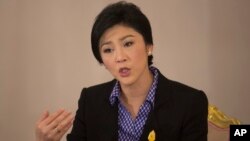Thai Prime Minister Yingluck Shinawatra announced that she will not resign ahead of snap elections, to be held February 2, despite opposition calls for her to step down.
Yingluck made the announcement Tuesday, a day after she said she would dissolve parliament. This follows more than a month of anti-government protests in Bangkok.
The Thai leader said in a televised address Monday that she will leave it up to the people to decide the future of the country. The king later issued a decree setting the date for the new elections.
However, opposition Democratic Party leader Suthep Thaungsuban said he will not end the demonstrations until Yingluck resigns and turns over the seat of government to an unelected "people's council." Police estimate more than 140,000 protesters surrounded Government House on Monday.
Yingluck says her Cabinet will remain intact, although with limited powers, and she will stay on as caretaker prime minister. Her party said that she will run again in the new elections.
Opposition lawmakers resigned from parliament en masse on Sunday.
At least four people have been killed and many wounded in recent protests. The demonstrations were triggered several weeks ago by an amnesty bill that would have allowed former prime minister Thaksin Shinawatra to return home and avoid a two-year jail term for corruption.
The Senate rejected the bill but protests have continued.
Thaksin, Prime Minister Yingluck's billionaire brother, was ousted in a 2006 military coup.
The conflict pits Bangkok's urban middle class and royalist elite against the mostly poor, rural supporters of Yingluck and Thaksin.
Yingluck made the announcement Tuesday, a day after she said she would dissolve parliament. This follows more than a month of anti-government protests in Bangkok.
The Thai leader said in a televised address Monday that she will leave it up to the people to decide the future of the country. The king later issued a decree setting the date for the new elections.
However, opposition Democratic Party leader Suthep Thaungsuban said he will not end the demonstrations until Yingluck resigns and turns over the seat of government to an unelected "people's council." Police estimate more than 140,000 protesters surrounded Government House on Monday.
Yingluck says her Cabinet will remain intact, although with limited powers, and she will stay on as caretaker prime minister. Her party said that she will run again in the new elections.
Opposition lawmakers resigned from parliament en masse on Sunday.
At least four people have been killed and many wounded in recent protests. The demonstrations were triggered several weeks ago by an amnesty bill that would have allowed former prime minister Thaksin Shinawatra to return home and avoid a two-year jail term for corruption.
The Senate rejected the bill but protests have continued.
Thaksin, Prime Minister Yingluck's billionaire brother, was ousted in a 2006 military coup.
The conflict pits Bangkok's urban middle class and royalist elite against the mostly poor, rural supporters of Yingluck and Thaksin.




